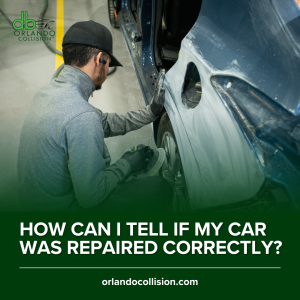Frequently Asked Questions
What is paint repair?
Paint repair refers to the process of restoring a vehicle's exterior finish by addressing scratches, dents, or chips in the paintwork. This service is essential for maintaining the appearance and value of your vehicle, often provided by auto body repair shops.
Can they fix frames?
Frame repairs are a crucial service offered by our auto body shop. Our skilled technicians are equipped to assess and fix damaged frames, ensuring your vehicle's structural integrity is restored effectively. For reliable autobody repairs near you, trust db Orlando Collision.
Can I get autobody repair near me?
You can easily find autobody repair services near you. Look for local auto body shops or collision repair centers that offer expert services tailored to your needs, ensuring quality repairs for your vehicle.
Do they repair trucks?
The question about whether we repair trucks can be answered as follows: Yes, we specialize in auto body repair and collision repair services for trucks, ensuring high-quality autobody repairs tailored to your vehicle's needs.
Are autobody repairs near me open?
Autobody repairs near you are typically open during regular business hours, but it’s best to check with local auto body shops directly for their specific hours and availability.
How to find autobody repair near me?
Finding autobody repair near you can be done easily by searching online for terms like "auto body shop near me" or "autobody repairs near me." This will help you locate reputable auto collision shops in your area.
What is car refinishing?
Car refinishing is the process of restoring a vehicle's exterior by applying new paint or clear coat, often after collision repairs or to enhance its appearance. This service is essential for maintaining the vehicle's value and protecting it from environmental damage.
Can I repair bumper?
Repairing a bumper is possible and often advisable, depending on the extent of the damage. Minor dents and scratches can typically be fixed at an auto body shop near you, while more severe damage may require professional autobody repairs.
What is body repair?
Body repair refers to the process of restoring a vehicle's exterior after damage from collisions or accidents. This includes fixing dents, scratches, and structural issues to ensure the vehicle is safe and visually appealing, typically performed at an auto body shop.
How much autobody repair cost near me?
The cost of autobody repair near you varies based on the extent of damage and the specific services required.
Which autobody repair near me is best?
The best autobody repair near you will depend on factors such as customer reviews, certifications, and service quality. Look for reputable auto body shops that specialize in collision repair and have strong local recommendations.
What is paintless dent repair?
Paintless dent repair (PDR) is a specialized technique for removing minor dents and dings from vehicles without the need for repainting. This method is ideal for maintaining your vehicle's original finish and is commonly offered by auto body shops and collision repair shops.
What autobody shops near me exist?
Autobody shops near you include various local options for auto body repair and collision repair services. To find the best fit, search online for "autobody repairs near me" or "body shop near me" to explore nearby auto collision shops.
How to fix car frame?
Fixing a car frame involves assessing the damage and using specialized tools to realign or replace bent sections. It’s best to consult an auto body repair shop for professional autobody repairs to ensure safety and effectiveness.
Who fixes car doors?
Car doors are typically fixed by trained professionals at auto body shops. These specialists handle various autobody repairs, ensuring that your vehicle is restored to its original condition after a collision. For reliable service, look for auto body collision shops near you.
What is collision repair?
Collision repair refers to the process of restoring a vehicle's body and frame after it has been damaged in an accident. This includes a range of services provided by auto body shops, such as dent removal, repainting, and structural repairs, ensuring your vehicle is safe and visually appealing.
What autobody services near me offer?
Autobody services near you offer a range of solutions including collision repair, dent removal, paint restoration, and frame straightening. Local auto body shops provide expert care to restore your vehicle's appearance and safety after an accident.
Do they fix dents?
They do fix dents. At db Orlando Collision, we specialize in auto body repairs, including dent removal, ensuring your vehicle looks its best. For expert autobody repairs near you, trust our experienced team at our auto body shop.
Who fixes car bumpers?
Car bumpers are fixed by professionals at auto body shops or collision repair facilities. These experts specialize in autobody repairs, ensuring that your vehicle is restored to its original condition after an accident or damage.
Where to get autobody repair near me?
Finding autobody repair services near you is essential for timely vehicle maintenance. Look for reputable auto body shops or collision repair facilities in your area by searching online for "autobody repairs near me" or "auto collision shops near me" to ensure quality service.
What techniques are used for dent removal?
The techniques used for dent removal include paintless dent repair (PDR), traditional body filler methods, and heat application. These methods effectively restore the vehicle's surface while maintaining its integrity, making them popular choices at auto body repair shops.
How long does paint repair take?
Paint repair typically takes between a few hours to a couple of days, depending on the extent of the damage and the specific services required at an auto body shop. For more precise timing, consult your local autobody repair shop.
What are common frame repair methods?
Common frame repair methods include straightening, sectioning, and replacing damaged components. These techniques are essential in restoring the structural integrity of vehicles at auto body repair shops, ensuring safety and performance after a collision.
Where can I find local autobody services?
Local autobody services can be found by searching online for terms like "autobody repairs near me," "auto body shop near me," or "collision repair shops near me." This will help you locate reputable auto body repair and collision repair services in your area.
What types of trucks do you repair?
We repair a wide variety of trucks, including light-duty, heavy-duty, and commercial models, ensuring expert auto body and collision repairs tailored to your vehicle's needs. Our auto body shop near you is equipped to handle all types of truck repairs efficiently.
What hours are autobody shops typically open?
Autobody shops are typically open Monday through Friday from 8 AM to 5 PM, with some shops offering extended hours or Saturday services. For specific hours, it's best to check with local auto body repair shops near you.
How do I choose the best autobody shop?
Choosing the best autobody shop involves researching local options, reading customer reviews, checking for OEM certifications, and comparing service offerings. Look for auto body repair shops near you that prioritize quality and customer satisfaction.






